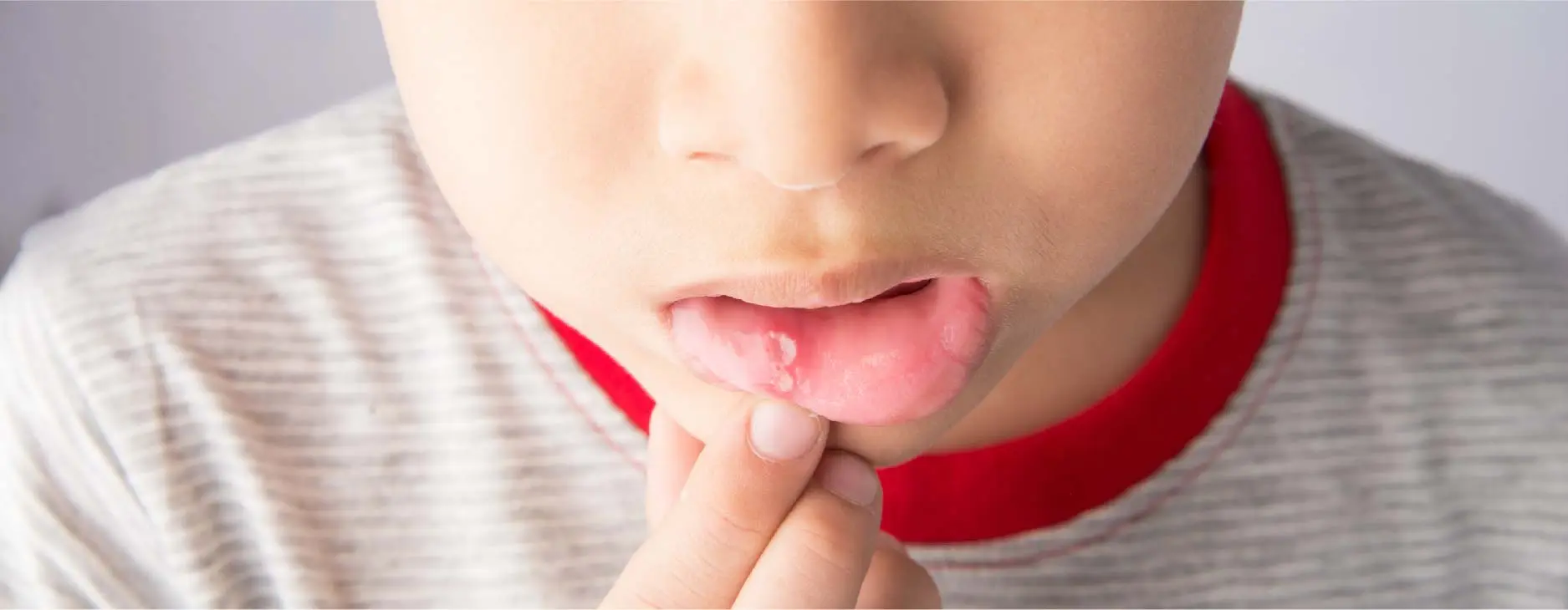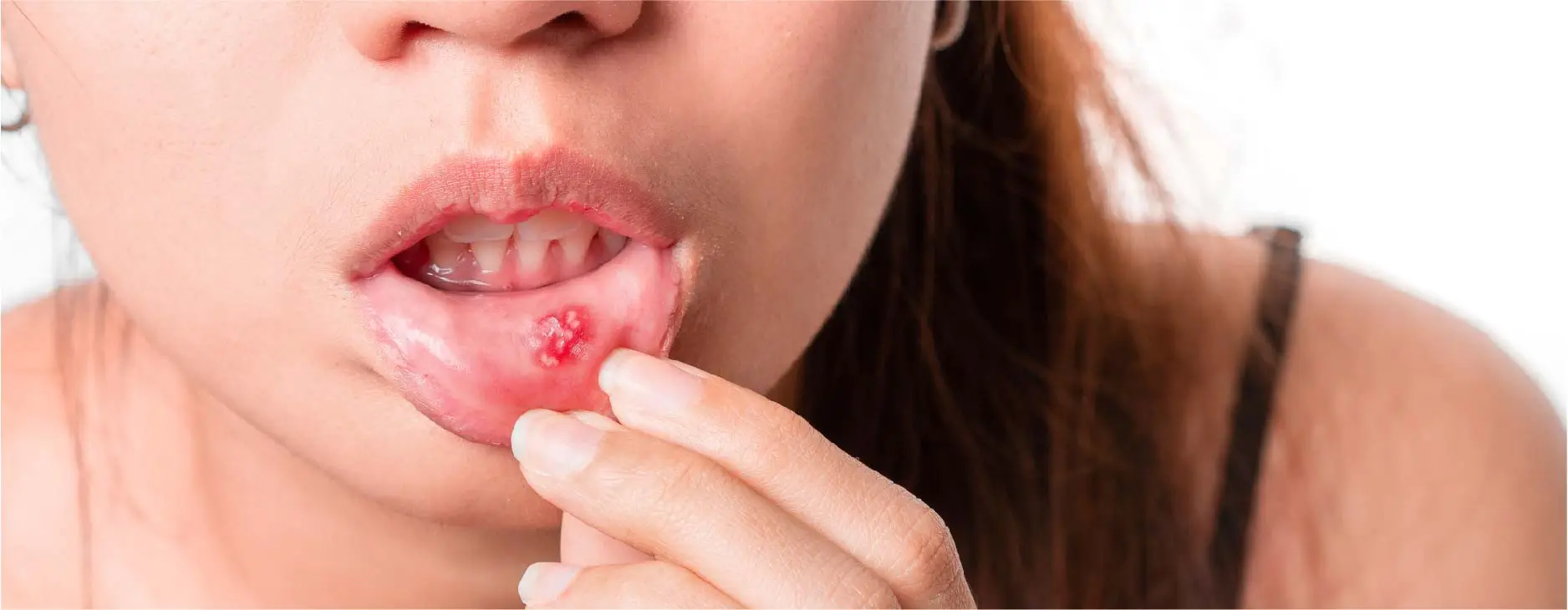An aphthous ulcer (commonly called “canker sore”) is a lesion in the mouth with red edges, a white center, and swelling. It appears on sensitive areas inside the mouth such as the tongue, cheeks, gums, or palate. As one of the most frequently encountered oral conditions, an aphthous ulcer makes eating and drinking painful and difficult. The size of these lesions can vary. They occur in about 20% of the population and, if left untreated, can impact quality of life.
This oral ulcer causes pain, itching, and burning sensations inside the mouth. It may result from vitamin deficiencies, infections, aggressive tooth brushing, poor oral hygiene, cheek-biting, burns from hot foods, orthodontic appliances, and similar factors. They often recur at irregular intervals, typically healing on their own in a few days. While usually solitary, multiple ulcers may appear simultaneously in different areas of the mouth or even the throat.
Aphthous Ulcers in Children and Infants

When aphthous ulcers appear in children and infants, they can be worrisome for parents. In winter months, common colds and flu can weaken immunity in children and infants, contributing to ulcer formation.
Another cause in this age group is inadequate nutrition. In such cases, immune-boosting supplements or diet adjustments may be needed. Signs of aphthous ulcers in infants may include difficulty sucking, refusal to feed, loss of appetite, reluctance to eat, increased drooling, mild fever, and general irritability.
Rapidly developing, painful lesions that may last up to three weeks can make infants and young children fussy. If an ulcer forms in a hard-to-see spot inside the mouth, parents may not notice immediately. But if the symptoms above appear and parents suspect an aphthous ulcer, they should consult a doctor.
Under medical supervision, topical ointments or antibacterial gels can help heal aphthous ulcers and speed recovery. For ulcers due to nutritional deficiencies, tests can determine if the infant or child needs vitamin supplementation, which is then recommended accordingly.
Also see: Everything You Need to Know About Mouthwash
What Types of Aphthous Ulcers Are There?
It is possible for one ulcer to heal while another appears. Although the precise trigger remains unknown, factors that provoke or worsen aphthous ulcers have been identified. Depending on size and presentation, ulcers are classified into three groups:
1. Minor Aphthous Ulcers
The most common type of oral ulcer, minor aphthous ulcers cause moderate pain. They may appear singly or in multiples, but each is under 1 cm in diameter. Typically they heal within 1–2 weeks without scarring, as superficial mucosal lesions.
2. Major Aphthous Ulcers
Unlike minor ulcers, major aphthous ulcers exceed 1 cm in diameter and appear grayish-white. They usually heal over two to six weeks, often leaving a scar. They can occur in the oropharynx (the space just behind the throat) and may cause obstruction or difficulty swallowing. Fever and fatigue may accompany major ulcers during flare-ups.
3. Herpetiform Aphthous Ulcers
These are rare, presenting as clusters or numerous tiny lesions, each about 1–2 mm in diameter. They heal within 7–30 days without scarring and are more common in older individuals.
Also see: What Causes Tooth Discoloration?
What Causes Aphthous Ulcers?

Many factors contribute to the development of aphthous ulcers. Recurring painful ulcers (recurrent aphthous stomatitis) affect about 1 in 5 people. They tend to occur more often in individuals of higher socioeconomic status and are seen more frequently in women than men. Genetic predisposition plays a role.
Other triggers include:
- Improper tooth brushing techniques
- Premenstrual period
- Trauma (e.g., accidental biting)
- Consumption of acidic or spicy foods (vinegar, pickles, salty or spicy dishes)
- Cheek or lip biting
- Systemic diseases
- Stress and anxiety disorders
- Certain medications
- Poor oral hygiene
- Smoking
- Hormonal changes
- Celiac disease
- Behçet’s disease
- Sodium Lauryl Sulfate (a foaming agent) in toothpaste
- Deficiencies of folic acid, iron, vitamin B12
- Periods of weakened immunity
What Are the Symptoms of Aphthous Ulcers?
Before an ulcer appears, one may sense tingling or soreness at the site. Ulcers can form on the tongue, soft palate, or back of the mouth, causing intense pain and lesions. Round or oval spots with red borders and white, gray, or yellow centers indicate an aphthous ulcer.
Other symptoms include pain that intensifies when speaking, swallowing, eating, drinking, or chewing. This pain can significantly affect daily life and reduce quality of life. In advanced cases, ulcers may spread toward the outside of the mouth and, in severe instances, lead to fever, fatigue, swollen lymph nodes, and general malaise.
Where Do Aphthous Ulcers Appear?
Aphthous ulcers occur inside the mouth (also called “mouth sores”). In advanced cases, they may extend toward the outer lip. Within the mouth, they can appear on the inner cheeks, soft palate, tongue, gums, and lips. These painful ulcers may also affect the throat area.
How Do Aphthous Ulcers Heal?
Often, aphthous ulcers heal spontaneously without treatment. However, if the pain is intolerable or significantly impacts life, treatment may be sought. Upon consulting a clinician, treatment aims to control pain, speed healing, and prevent recurrences.
Treatment varies by ulcer severity:
- Topical anesthetic, antiseptic, or anti-inflammatory agents applied by a dental professional
- For stubborn major ulcers unresponsive to topical therapy, systemic treatments via tablets or injections may be considered
- Successful treatment is indicated by reduction in ulcer size and pain
If ulcers recur frequently, further evaluation is needed to identify underlying causes. If hematologic deficiencies are suspected, laboratory tests (complete blood count, folate, vitamin B12 levels) are ordered. If indicated, zinc sulfate, cyanocobalamin, or B12 supplementation is started. Systemic immunosuppressive drugs may be used for severe, recurrent cases.
For mild minor ulcers, home remedies can help relieve pain: applying a mixture of water and baking soda on the ulcer, or gargling with saltwater three times daily can be beneficial.
What Helps Aphthous Ulcers?
Avoid irritating, acidic, spicy, or very hot foods for a period. Consuming immune-boosting fruits and vegetables may help prevent recurrences. Brushing teeth after every meal and maintaining regular oral hygiene significantly reduce ulcer formation risk.
Smoking is a known precipitant; those prone to ulcers are advised to quit. Avoid hard or abrasive foods that may irritate lesions.
Gargling with a mixture of sumac and water can help reduce infection in the ulcer and clear viruses in the mouth. Miswak use has also been observed to aid healing of gum lesions.
Ill-fitting dental prostheses or orthodontic appliances causing chronic trauma can trigger ulcers; affected individuals should consult their dentist for adjustments.
Frequently Asked Questions about Aphthous Ulcers
How Do Mouth Ulcers Heal?
Most mouth ulcers heal on their own. Gargling with salt water can speed recovery. If needed, nutritional supplements may help prevent recurrences.
When Does an Aphthous Ulcer Become Dangerous?
Recurrent, large, and severe ulcers are concerning. Ulcers on the lip, inner cheek, or tongue require prompt dental evaluation. Frequent ulcers may signal Behçet’s disease, so underlying causes should be investigated.
What Are Recurrent Aphthous Ulcers?
Recurrent aphthous ulcers are painful round or oval lesions with red borders and whitish centers that appear repeatedly. If three or more ulcers occur in one year, they are considered recurrent.
What Happens If You Pick at an Ulcer?
Picking at an aphthous ulcer causes severe pain and may increase infection, potentially leading to more serious complications.
Are Aphthous Ulcers Contagious?
No, aphthous ulcers are not contagious.
Are There Medications for Aphthous Ulcers?
Yes. Many topical medications exist for aphthous ulcer treatment. While they often heal spontaneously, if needed, topical anesthetics, antiseptics, anti-inflammatory agents, or immunomodulatory drugs may be used.
Which Vitamin Deficiencies Cause Aphthous Ulcers?
Deficiencies of iron, folic acid, and vitamin B12 can contribute to ulcer formation.


















































